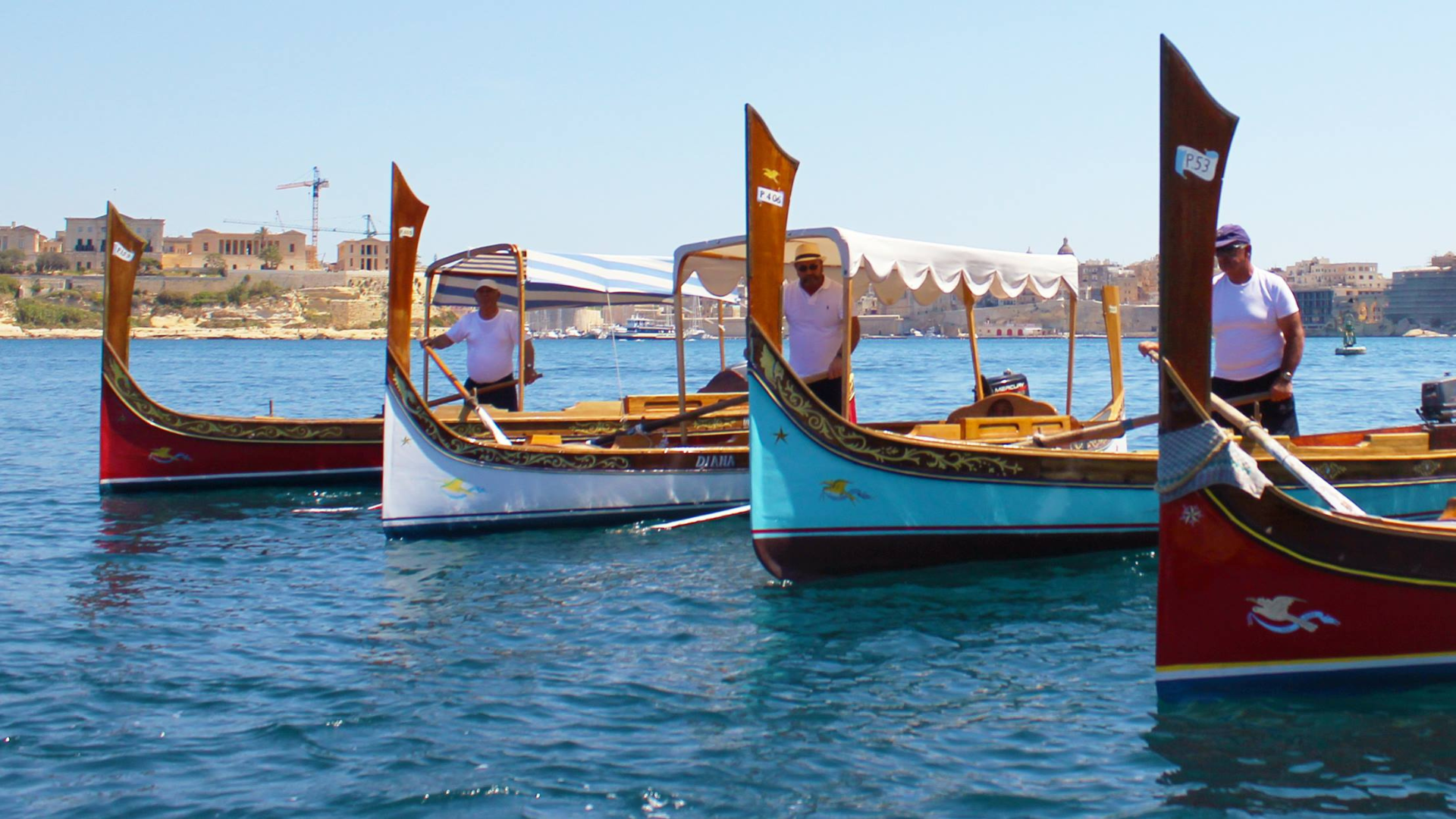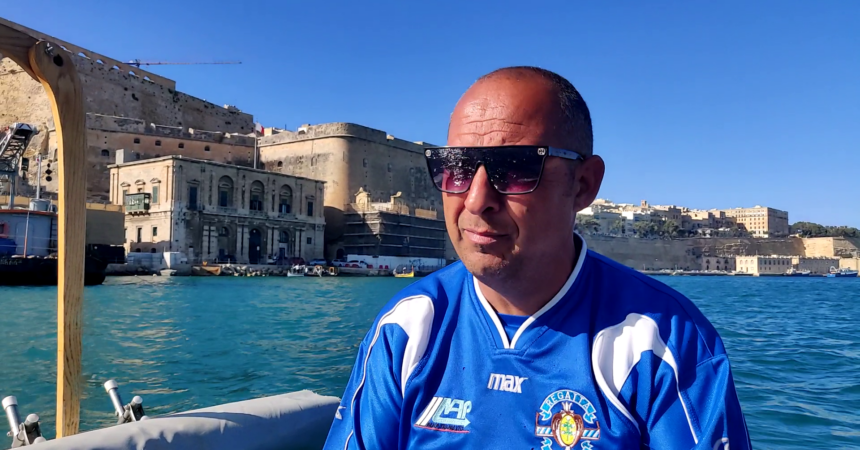Ivan Agius, a traditional boatman (barklor) from Bormla, hopes “for a future where my son can grow older and enjoy the dgħajsa tal-pass in the same way that my generation did”.
Agius has worked as a part-time boatman for almost 10 years, having obtained his colourful traditional boat from a friend after growing up as “part and parcel of the Bormla Regatta Club”.
In an interview with The Shift on Wednesday, Agius recalls how he shed tears when recently reading into government policies and parliamentary debates related to traditional boatmen and their berthing spots that date back 90 years.
“I realised what a far cry the politicians of the last 30 years or so are from those of back then,” he said, citing the former respect and protection barklori had always enjoyed from both sides of the House. But years of government neglect have now left a bitter taste.
Against the odds, Agius and a group of boatmen are seeking to protect a dying tradition from what could be a death blow in the form of government plans to have one of their traditional landing spots in Valletta swallowed up by a cruise liner terminal.
Being a boatman, Agius said, “used to be a job like any other but it has become so rare nowadays that, without support, it is at risk of becoming a cultural artefact.
“All of my great-uncles used to be traditional boatmen, they used to show up to work with their suit jackets folded over their arms,” Agius recalled.
“Anyone from Cottonera has grandparents who used to work as barklori. There were more than 1,300 of us about 90 years ago.”

The traditional Dgħajsa Tal-Pass. Photo: Facebook/Harbour Tours Malta.
Speaking about his 19-year-old son Dean, Agius recalled how he earned his boating licence as soon as he turned 18, even before he got his driving licence.
While his love for the sea has been passed down through the generations, Agius recalls how “I had to tell him to look for another job as this line of skilled work was dying and it would be better to leave it as a hobby.
“How could I ever tell him to work here when I know there are people out there trying to eat us up?” he asked.
Working as a boatman nowadays is no easy feat. Agius explained how they now have to compete against larger, faster and more modern vessels operating the same routes.
Such companies have the financial strength to advertise widely and enter into exclusive concession agreements with the government.
But, Agius stresses, “It is us common people who are keeping this tradition alive. A museum could not manage it.”
Some of the boats still in operation were around a hundred years old and lovingly maintained to ensure their continued seaworthiness. Agius’ own boat dates back to the 1970s.
“We are tired of being put on the back burner,” he says. “We need support.
“My children won’t inherit palaces, towers, hotels or flats. They’ll inherit this boat.
“And I’m sure that when they do, they’ll say ‘My father might not have left us money, but he left us the tools to make an honest living and keep Malta’s cultural heritage alive’.”
The dgħajsa tal-pass is a traditional Maltese boat historically used to ferry passengers in and around the Grand Harbour, Cottonera, and Marsamxett Harbour.
One of its traditional berthing places at Lascaris Wharf has been in use for more than 400 years but that is now being threatened by the new plans.
The plans for the cruise liner terminal extension fail to accommodate the dgħajsa tal-pass service in a manner that does not threaten its very existence or in a way that is safe for the barklori and their passengers.
“I hope for today’s tourists to be able to return to Malta with their children and experience the dgħajsa tal-pass and the barklori, rather than having to visit a museum to see it.”
It is thanks to the continued passion of the remaining barklori that the dgħajsa tal-pass remains a feature of the Grand Harbour and surrounding port areas, dutifully ferrying passengers from one side of the port to the other and conducting scenic harbour tours.
Agius observes how traditional boatmen have already lost some of their other historical berthing and landing spots such as those in Marsamxett Harbour, where they no longer, or rarely, operate.
“The dgħajsa is being thrown out of its home, it’s become shunned,” he said.
It took last week’s protest to get politicians around a table to discuss their fate after barklori had been begging for a solution for years.
Following the protest, the transport ministry’s chief of staff and permanent secretary contacted the barklori to try and offer a solution that would smooth things over.
While there seems to be an agreement on a long-term proposal, which will take two years to come to fruition, the ministry has said that, in the short term, “Everyone needs to make sacrifices.”
It seems, however, that it is only the barklori who have been asked to make concessions while the bigger players in the area have retained their positions.
The barklori argue the solution being proposed by the government will lead to their services being severely impacted while exposing them and their clients to unnecessary safety risks unless significant changes are made to the way their competitor operates and infrastructure is provided to afford them shelter from the Gregale winds.
Agius hopes that, with the right support, the barklori tradition will be able to flourish again and that being a boatman can become a full-time occupation for more people.
Agius referenced how the gondola is revered in Venice and how gondoliers occupy prime real estate from which they advertise and operate.
There is also a regular ferry service in Venice that works in tandem with the gondoliers and which does not put their existence at risk.
Just as Venice has recognised the gondola as an inherent piece of its culture worth protecting and worth saving, Agius hopes that one day soon, the dgħajsa tal-pass will be afforded the same respect and consideration.














Jekk ma noqodux attenti anke r-regatta tradizzjonali tispicca.
And you think the Minister or Prime Minister or the Gahan will bother?
Not unless there is money going in somebody’s pocket will something happen.
Malta has ” id-dgħajsa tal-pass” .
Venice has ” La Gondola”
Venice threw out the Cruise liners out of the Venice Lagoon , to protect the Gondola’s and the Boat Transport.
In Malta the Tourism Minister throws out our History from his window into sewer. But then what do we expect from a Stupidly Smiling Minister.
Not correct. Gondolas where not the issue. Temporarily Gov needs entet into an arrange with Valletta Cruise Port to afford a berthing place to dajghsas at the Laguna until alternative berth is secured. VCP need to have a conservancy approach towards our heritage. Plus dajghsas could be an attraction to cruise passengers. Tourism should promote this service as a partical niche.
Should the authorities dredge further towards the “Pixkerija”, it would be perfect for them.